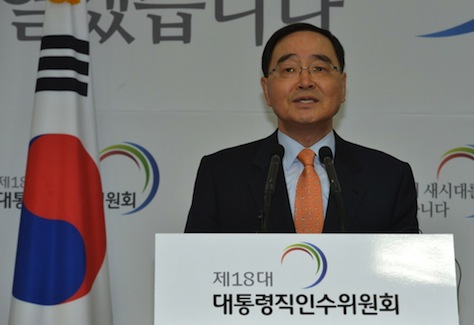Six weeks after the horrific ferry accident in South Korea that killed 300 people, and following two failed attempts to find a new prime minister, president Park Geun-hye (박근혜) has decided to retain Chung Hong-won (정홍원) after all.![]()
Chung (pictured above) previously announced his resignation as prime minister on April 27, taking responsibility for the government’s performance in the aftermath of the Sewol ferry disaster, with the intention of stepping down as soon as Park could appoint a successor.
But along the way, Park ran into trouble.
Her first nominee, Ahn Dae-hee (안대희), a longtime state prosecutor and a former South Korean supreme court justice appointed by the late former president Roh Moo-hyun in 2006, was nominated on May 22.
But Ahn (pictured above) withdrew a week later on ethics concerns over the massive amount of money he earned in the months after leaving the supreme court.
Her second nominee, Moon Chang-keuk (문창극), a former journalist and former editor of Joongang Daily, withdrew from consideration on June 24, after making comments at a church that Japanese colonization of Korea between 1910 and 1945 was God’s will, something of a controversial statement where Korean-Japan relations in the early 20th century still cause tensions.
It didn’t help that many South Koreans felt Moon (pictured above) was unqualified to be prime minister, nor that Moon had often expressed nostalgic admiration for the regime of Park’s authoritarian father, Park Chung-hee (박정희), who ruled South Korea from 1961 to 1979.
Neither candidate even made it to a vote in the National Assembly (대한민국 국회).
Accordingly, in exasperation, Park announced late last week that she will retain Chung, a novel approach that has the benefit of giving South Korea a permanent government for the first time in six weeks, and it clears the way for the confirmation hearings of nine additional cabinet members.
The troubles over Park’s prime ministerial choices are in addition to massive disapproval with Park in relation to the ferry disaster, which forced Park into a tearful apology on national television for her government’s slow response and the failures leading up to the tragedy.
In response, Park has dismissed South Korea’s coast guard, and she has fired her National Security Council chief and the director of the National Intelligence Service as well. The incident exposed troubling aspects of transportation safety and collusion between government regulators and private sector.
Chung, as it turns out, isn’t the worst choice.
He oversaw the legislative election nomination process in 2012 for Park’s ruling Saenuri Party ( 새누리당 or the ‘Saenuri-dang‘, the New Frontier Party). Long respected as a dogged prosecutor, Chung served for two years from 2004 to 2006 as comissioner of the Korean election commission and from 28 to 2011 as president of the Korea Legal Aid Association.
But it’s worth noting that even before his appointment in February 2013, Chung wasn’t Park’s first choice. That was Kim Yong-joon, then aged 74, a former chief of South Korea’s constitutional court and the head of Park’s transition committee. Kim withdrew from consideration after controversy surrounding ethical lapses, namely dodgy real estate transactions and military service exemptions for his two sons. Stumbles in the transition caused Park’s popularity to fall even before her February 2013 inauguration.
That gives Park a 25% success rate in nominating prime ministers, which underlines some of the doubts of South Korean voters about Park after electing her handily in the December 2012 presidential election. Kim and Ahn undermined her pledge to take corruption more seriously after the scandal-plagued administration of Lee Myung-bak (이명박). Moon’s selection called into question how seriously Park understands the controversy over her father’s questionable legacy, notwithstanding her landmark apology in September 2012 for his regime’s excesses.
In the current situation, where the same party controls the presidency and the 300-member National Assembly, the prime minister is relatively less important than the president and her aides in the Blue House.
But under a new government reorganization plan after the ferry incident, the prime minister will hold expanded domestic policy powers, including the supervision of national safety and state administration. Despite Chung’s statements to pursue reform with renewed vigor, critics in the opposition worry that Park’s decision to retain Chung as prime minister may indicate she’s not incredibly serious about reforming Korean governance.



Hey there! Quick question that’s entirely off topic.
Do you know how to make your site mobile friendly? My site looks weird
when viewing from my iphone 4. I’m trying to find a template or plugin that might be able to fix
this problem. If you have any recommendations, please share.
Thanks!
Feel free to visit my web page; read full article